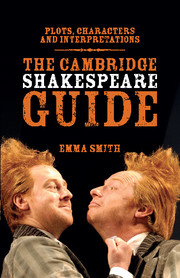Shakespeare’s theatre
Published online by Cambridge University Press: 05 April 2012
Summary
‘All the world’s a stage’
Purpose-built theatres were an Elizabethan invention. The opening in 1567 of the Red Lion, the first playhouse building, began a process which would transform the travelling mode of medieval drama into a fixed, commercially successful and artistically innovative London industry. As with any new technology, there were anxieties about this project: Puritan preachers claimed that the theatre inculcated immoral behaviour, the London authorities feared that large gatherings of theatregoers were a cover for criminality and disorder, and the office of the Master of the Revels, who authorised plays for performance and for publication, increased in power over the period. But when in 1599 the Lord Chamberlain’s Men, and their resident playwright Shakespeare, called their new, state-of-the-art theatre on the south bank of the Thames ‘the Globe’, there was no mistaking their ambition.
Jaques’ famous ‘All the world’s a stage’ speech in As You Like It gestures to a serious contemporary equivalence between theatre and life. As Sir Walter Ralegh put it, life is a ‘short comedy’ with ‘Heaven the judicious sharp spectator’: ‘only we die in earnest – that’s no jest’; both Queen Elizabeth and James acknowledged the inherent theatricality of the role of the monarch; and describing an actor, John Webster admitted that ‘all men have been of his occupation’. The conventional opposition is not, as we might expect, between acting and real life, but between the professional and the amateur in a histrionic world where all are performing. It recalls York’s description of the difference between the crowd’s reception of the disgraced King Richard and his challenger Bullingbrook: ‘as in a theatre the eyes of men / After a well-graced actor leaves the stage / Are idly bent on him that enters next, / Thinking his prattle to be tedious’ (5.2.23–6). Frequent self-conscious comments like this make clear that the theatre is rarely illusionistic in this period, and, rather, reflects explicitly on its own material form.
- Type
- Chapter
- Information
- The Cambridge Shakespeare Guide , pp. 227 - 231Publisher: Cambridge University PressPrint publication year: 2012



